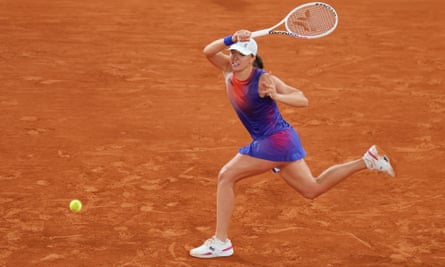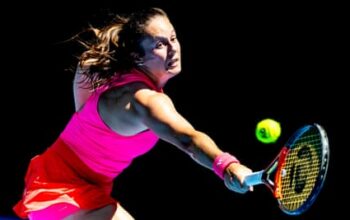After spending her earlier years setting rare milestones owing to her precocity, Coco Gauff now comes into the biggest tournaments armed with an even more important strength: experience.
As the third seed defeated Dayana Yastremska 6-2, 6-4 in a bruising battle on Friday, Gauff’s win sent her into the fourth round of Roland Garros for the fourth successive year, making her only the second American to do that in the open era at the age of 20, Jennifer Capriati being the first in 1993. Gauff was then asked about having won more matches in Paris at her age than Chris Evert.
“It’s very cool to be in the same stat line as these great legends, but I try not to think too much into it because they’re legends for a reason,” said Gauff. “I’m not near that. I hope to aspire to be, but I’m not. It does give me motivation to keep trying to do better.”
As she looks to follow up her first grand slam title at last year’s US Open, the Floridian has enjoyed an up-and-down year so far. She has recently rehired the coach Jean-Christophe Faurel, alongside Brad Gilbert. She has had problems with her serve, which she says occur when leaning too far to her left side during the motion. She has adjusted her serve with a lower toss.
On her favourite surface, Gauff, a finalist here in 2022, seems to have turned a corner. She arrived in Paris after a strong semi-final run in Rome two weeks ago, where she lost in two tough sets to eventual champion Iga Swiatek.

Despite growing up on hard courts, red clay has proved a perfect fit. As one of the best athletes in tennis, her supreme court coverage and defence are only accentuated by the surface, making it hard for opponents to consistently pass her.
The slow, high bounce on clay also complements Gauff’s forehand, which she has extra time to set up and is more effective with the heavy topspin it generates.
All of those qualities were in focus against Yastremska, an attacking baseliner whose ethos is to hit big and, if that fails, hit even bigger. Gauff’s defence made the court seem narrow, frustrating the Ukrainian who reached this year’s Australian Open semi-finals. Gauff moved through comfortably, surviving a tight final service game to close it out.
Along with experience comes greater maturity, and Gauff speaks about her ambitions with a welcome perspective. Asked about the specific techniques she employs in order to manage the pressure, she said: “Sometimes I like to lay on the ground and just meditate, whether it’s for literally a minute or two or 10 or 15. It just kind of depends on the day or how I feel.
after newsletter promotion
“I think it helps to keep you grounded because sometimes in these tournaments the pressure can feel like a lot, and I think sometimes you just lay on the ground, and you just think that – I don’t know. There’s billions of people on this earth and billions of people don’t even know who you are. So the matches aren’t as big as they feel sometimes.”
Next up for Gauff is Elisabetta Cocciaretto, an unseeded Italian who defeated Liudmila Samsonova to reach the fourth round of a grand slam for the first time in her career. She remains on a potential semi-final collision course with Swiatek, the defending champion and top seed, whose record is W10 L1 against Gauff.
Two days after her brutal, thrilling instant-classic win against Naomi Osaka, Swiatek, on her 23rd birthday, re-established her rhythm with a competitive but comfortable 6-4, 6-2 win over Marie Bouzkova to set up a meeting with Anastasia Potapova in the fourth round. Last year’s Wimbledon finalists Marketa Vondrousova and Ons Jabeur also continued to find their feet on the red clay after tough seasons so far, with Jabeur, the eighth seed, edging past Leylah Fernandez 6-4, 7-6 (5) and fifth seed Vondrousova easily beating Chloé Paquet 6-1, 6-3.


